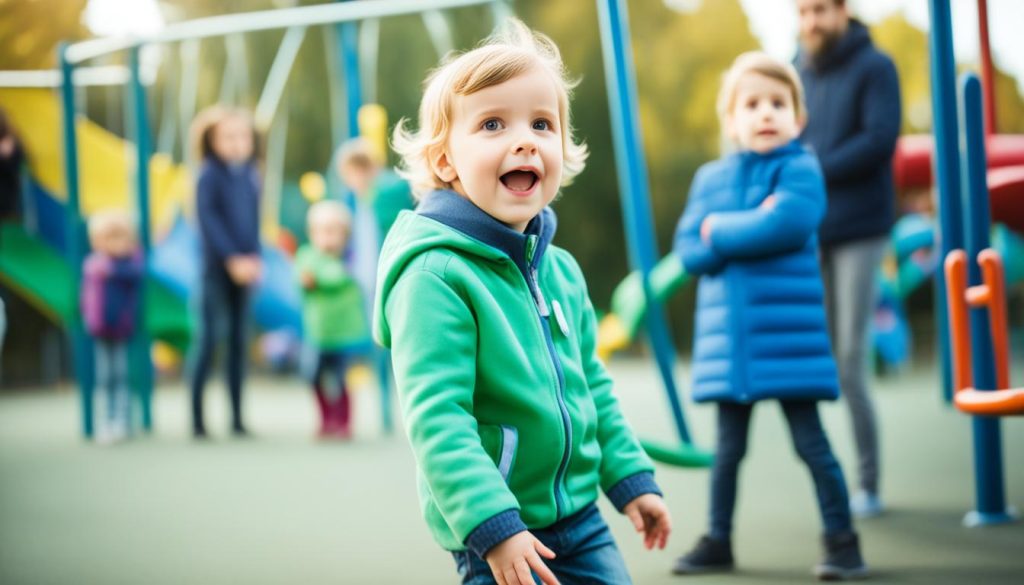Imagine watching your 13-year-old daughter struggle through lunchtime, feeling alone among her classmates. You’ve been there, guiding her through the tough world of making friends. It’s a tough journey for both of you, filled with worry and hope. As parents, we must help them be independent and support their mental health through these social challenges.
It’s crucial to encourage our kids to find real, healthy friends. It’s not just about being liked by everyone, but about finding that one friend who really gets them. By creating spaces for them to meet, mentor, and live with purpose, we show them their value goes beyond what others think. We guide them to live as children of light, making good choices and avoiding bad influences, inspired by Ephesians 5:8-10.
Studies show that being warm and positive with our kids (Pastorelli et al 2015) and being sensitive and responsive (Pearcy et al 2020) helps them make better friends and form strong bonds. But being too strict or ignoring them can cause social and emotional problems (Cook et al 2012; Denham 1997). So, it’s important to use parenting methods that boost their self-esteem and help them deal with social setbacks.
Let’s take this journey together, with wisdom, kindness, and the goal of helping our kids be independent and mentally healthy. Let’s be intentional in helping them navigate the social world, giving them the tools they need to succeed.
Key Takeaways
- Positive discipline helps develop children’s social skills and attachments.
- Authoritarian parenting can lead to anxiety and poor-quality friendships.
- Encouraging true, healthy friendships over fitting in promotes self-worth.
- Creating intentional spaces for children to socialize improves their social interactions.
- Engaging in discussions about coping with negative emotions enhances self-regulation skills.
- Responsive parenting supports socially-anxious children in forming secure relationships.
- The Bible verse Ephesians 5:8-10 can guide children in finding good friends.
Understanding the Importance of Childhood Friendships
Childhood friendships are key to a child’s growth. They help kids understand and manage their feelings. These early bonds teach kids how to be empathetic and work together.

These relationships also help kids develop important social skills. They learn to share, talk, and solve problems. This prepares them for strong relationships later on.
Friendships meet basic social needs like feeling like they belong and being valued. This gives kids a sense of safety and happiness.
Studies show that having good friends boosts a child’s self-esteem. Kids with strong friendship skills deal better with social and emotional issues. Learning through friendships helps kids grow in all areas, not just their minds.
Childhood friendships do more than just provide fun and company. They deeply affect a child’s thoughts, feelings, and actions. Proverbs 22:24-25 shows how friends shape our lives.
Parents should help kids choose friends wisely. Encouraging friendships that share their values, as in Ephesians 5:6-7, helps kids grow spiritually and morally.
Childhood friendships have long-term benefits too. Playing with others helps kids make lasting friends. Joining clubs or sports teams gives them a chance to meet others with similar interests.
It’s vital to support your child in making and keeping healthy friendships. Loneliness and boredom have increased, making strong relationships more crucial. By valuing these friendships, you help your child grow emotionally and intellectually.
Identifying Social Challenges in Children
Positive parenting is key to understanding your child’s behavior and spotting social challenges early. By doing so, you can use effective discipline strategies. These strategies help improve your child’s social skills and emotional control.

Signs Your Child is Struggling with Friendships
It’s important to watch and act when your child’s social health is at risk. Look out for signs like not wanting to go to social events, feeling left out, and mood swings after being with friends. Knowing these signs helps you tackle social challenges.
Common Social Issues and Their Impact
Kids face many social problems, like bullying, peer pressure, and feeling left out. These issues hurt their emotional and mental health. Without support, kids may feel anxious, sad, or lonely.
Positive parenting and good discipline are crucial. They help kids deal with these problems and make healthy friends.
| Common Social Issues | Potential Impacts | Parental Strategies |
|---|---|---|
| Bullying | Increased anxiety and depression | Provide emotional support, communicate openly |
| Peer Pressure | Risky behaviors, low self-esteem | Encourage open dialogue, reinforce positive behavior |
| Social Rejection | Loneliness, withdrawal | Foster inclusivity, boost confidence |
Supporting Positive Parenting for Better Social Skills

Teaching kids good social skills starts at home with positive reinforcement parenting. By teaching them to be grateful and empathetic, parents create a supportive space for kids to grow socially. Studies by Pettit, Bates, and Dodge (1997) show that supportive parenting leads to better school performance and fewer behavior problems.
Modeling Good Social Behavior at Home
Kids learn by watching their parents. Showing them respect and kindness sets a strong example. The Gottman Institute’s 5-step emotion coaching program says parents play a big role in teaching kids to manage their feelings well.
Encouraging Empathy and Kindness
A key part of positive parenting is fostering child empathy. Praise your child for trying to understand others and for being kind. Doing things for others, like volunteering together, teaches them about compassion and community.
To help these traits grow, set aside time for talking about feelings and sharing stories. Encouraging kids to be creative helps them see things from different views and understand people better.
| Key Area | Impact |
|---|---|
| Teaching Gratitude to Kids | Builds a positive outlook and enhances social connections. |
| Positive Reinforcement Parenting | Improves self-esteem and promotes positive behaviors. |
| Nurturing Child Creativity | Develops problem-solving skills and emotional intelligence. |
| Fostering Child Empathy | Enhances social harmony and reduces aggressive behavior. |
Adding these elements to daily life helps your child now and later. It prepares them for strong, meaningful relationships.
Building Self-Esteem in Children to Handle Social Rejection
Helping kids build self-esteem is key to navigating social situations. By age five, they may not know how to act, leading to staring or awkward comments. Parents should use these moments to teach them about independence and resilience.
It’s important to praise kids specifically and truthfully. Saying “good job” often loses its meaning. Praising their unique efforts and achievements can really help. This builds their self-esteem and prepares them for social challenges.
Siblings also play a big part. A positive family environment helps kids deal with social issues. Parents should celebrate each child’s uniqueness while making them feel they belong. This boosts their resilience.

Studies show how parents affect their kids’ self-esteem and confidence. Feeling safe at home helps kids face social challenges. About 20% of kids often face rejection, showing the need for parental support.
Parents can help their kids by addressing peer rejection and using strategies that fit their comfort level. This balance helps kids value themselves and fit in socially.
When parents support their kids and understand their feelings, it helps them build self-esteem. Kids with consistent support from parents can recover better from social setbacks.
| Age Group | Percentage Facing Social Rejection | Resilience Rates |
|---|---|---|
| 5-8 years | 20% | 50% |
| 9-12 years | 25% | 60% |
| 13-16 years | 30% | 70% |
Too much pressure for grades can hurt a child’s self-esteem. But focusing on learning from failures can boost their motivation. Too many parental interventions can also hurt their confidence, making social challenges harder.
In summary, a balanced approach to praise, emotional safety, managing sibling rivalry, and valuing individuality helps kids. This prepares them to handle social rejection and grow into resilient people.
Managing Screen Time and Encouraging Offline Interactions
In today’s fast-paced world, managing screen time for kids is a big worry for parents. Kids aged 8 to 12 spend 4 to 6 hours a day on screens. Teenagers can spend up to 9 hours a day. It’s important to balance screen time to help kids grow healthy.
Balancing Digital and Offline Friendships
It can be tough to balance work, family, and screen time. But, by setting limits and encouraging offline play, parents can help kids build strong social skills. It’s key to support kids in keeping both digital and real-life friends. Hosting playdates and encouraging face-to-face time can enrich their social lives.
Promoting Face-to-Face Playdates
Encouraging offline play is more than just limiting screen time. It’s about boosting real-world interactions. Regular playdates help kids learn important skills like communication and teamwork. By making time for these activities, parents can help kids become well-rounded individuals.
“Screen time, when managed effectively, can coexist harmoniously with offline play, fostering well-rounded development in children.” – American Academy of Pediatrics
In today’s digital age, it’s crucial to mix digital and offline activities. This balance helps manage screen time and boosts kids’ social and emotional health.
| Age Group | Average Screen Time | Suggested Screen Time |
|---|---|---|
| 2 to 5 years | 4 hours/day | 1 hour/day |
| 8 to 12 years | 6 hours/day | Consistent limits |
| Teenagers | 9 hours/day | Consistent limits |
It’s key to balance screen time and offline activities in parenting today. By supporting face-to-face playdates and keeping an eye on digital use, parents can help their kids live healthier lives. This leads to strong social skills and emotional growth.
Teaching Kids Responsibility in Their Social Interactions
Teaching kids about social responsibility is key to their growth. It means setting clear rules and expectations for them. By doing this, you help them understand the value of respect and empathy in friendships. It also helps them learn how to behave responsibly and think about others.
Setting Boundaries and Expectations
Setting clear boundaries is vital for kids to feel safe and secure. It shows them what’s okay and what’s not. A Wall Street Journal article says giving kids chores early on helps them grow into responsible adults. It builds their confidence and sense of self-reliance.
Parents should listen well by nodding and repeating what kids say. This makes them feel understood and valued. Praising good behavior encourages them to do more of it. Planning for tough situations can also help manage their behavior when things get hard.
Encouraging Accountability in Friendships
Teaching kids to be accountable in friendships teaches them about respect and empathy. Letting them make mistakes and learn from them is valuable. It helps them grow and become more independent.
Encourage kids to take on tasks at home and in the community. This could be through volunteering or helping out. These activities teach them about responsibility and community spirit. Praising their efforts makes them more likely to keep up good behavior.
Using humor can make things lighter, but don’t tease or encourage bad behavior. Listening well helps kids improve their language skills and feel for others. Learning to work together and share is key to getting along with others.
| Strategy | Benefits |
|---|---|
| Setting Boundaries with Kids | Creates a secure environment and defines acceptable behavior. |
| Teaching Responsibility to Children | Fosters independence and accountability through chores and tasks. |
| Family Respect and Empathy | Develops empathy and social awareness in children. |
| Effective Discipline Strategies | Reduces challenging behavior and reinforces positive actions. |
Addressing Bullying and Cliques
Dealing with bullying and school cliques is tough for kids, especially in middle school. Cliques often start here, leaving some kids inside and others out. It’s key to help kids feel supported and independent.
Parents play a big role in how kids deal with bullying and cliques. By acting positively at home, you help your child. Teach them to stand up for what’s right and value deep friendships over just being part of a group.
Getting kids involved in clubs or sports helps them meet more people and have positive experiences. This can balance out the negative parts of school life.
It’s important to stop aggressive behavior early, as it can come from home or friends. Therapy and school counselors can help kids who act out. Teaching kids to be kind and respect others at home fights against mean media images. Letting kids make their own choices helps them deal with bullies and live a balanced life.
Fixing bullying early is key to a child’s success in school and friendships. Most teens see online bullying as a big problem. Parents should be aware and act to stop cyberbullying. By being supportive and getting help when needed, you can make your child stronger against bullies.
Teaching kids to own up to their actions helps them avoid being bullies or getting bullied. Talk openly with your child about social issues and help them find good friends. This builds their social skills and confidence. Fighting bullying and cliques needs work from families, schools, and kids together.
Promoting Parent-Child Communication About Friendship Issues
Talking with your child about their friends is key to helping them through tough times. It makes your bond stronger and helps them learn important social skills. It also gives them the confidence to deal with friends.
Conversing Openly About Social Difficulties
Talking openly lets kids share their feelings and stories without fear. Use simple words and get down to their level to make them feel safe. Listening well shows you care about what they say, making them feel secure and closer to you.
Listening and Providing Emotional Support
Listening means more than just hearing words. It’s about understanding their feelings and supporting them. Use positive parenting by valuing their emotions and their efforts to handle social issues. Ask them more questions to help them share more about their feelings and thoughts.
Quality time with your child is key to teaching them about social skills and understanding their world. Talking about their daily life keeps you in touch with their needs and worries. This keeps the parent-child connection strong and builds trust, making your child feel loved and safe.
Parenting and Raising Kids to Form Healthy Relationships
Parenting is key to helping kids build strong relationships. About 6 out of 10 kids in the U.S. form secure bonds with their parents. But 4 out of 10 don’t. It’s vital to teach kids about hard work, healthy habits, and hobbies to help them grow strong.
Children without secure attachments might face serious issues. It’s crucial to connect with them positively and teach coping skills from age three. This helps them manage their feelings and actions.
Parents who are not always there can upset kids, making them feel rejected. This can hurt their sense of safety and make it hard to make friends. So, being there for your child and understanding their feelings is key.
Encouraging kids to have hobbies is also important. Whether it’s sports, art, or school projects, it helps them feel good about themselves and make friends. This builds a strong support system for them.
Parents should teach kids about hard work too. Giving them chances to try and achieve things shows them the value of not giving up. This builds their confidence and sense of responsibility.
Creating a loving and stable home is crucial. It’s not about giving them everything they want but understanding their needs. Simple actions like setting rules, playing with them, and listening can strengthen your bond.
Being flexible and understanding as a parent is key. Adjusting your approach to fit your child’s needs helps a lot. Remember, you can always work on having a better relationship with your child, no matter what challenges you face.
| Aspect | Method | Outcome |
|---|---|---|
| Teaching hard work to children | Provide consistent opportunities for effort | Grasp the value of perseverance |
| Developing healthy habits in kids | Set consistent boundaries and routines | Strong emotional and social health |
| Encouraging child hobbies | Support interests in sports, arts, academics | Build self-confidence and social bonds |
| Building resilience in kids | Teach active problem-solving and coping skills | Equip to handle life’s challenges |
Encouraging Children to Pursue Extracurricular Activities
Encouraging kids to join extracurricular activities is key to their growth. It’s important to think about different child learning styles when choosing activities. This helps match activities with what your child likes and helps them grow.
Outdoor play is great for kids’ health and minds. Sports, hiking, or simple games outside help creativity and balance. It suits many child learning styles, making kids do well in a lively setting.
Play is vital for kids’ growth. It helps with thinking and social skills. Free play is especially good for kids, letting them learn without the stress of winning.
Mixing structured and free activities works well. Kids do better in unstructured activities, which help them make choices and be independent. Letting kids pick their own activities makes them more into it. It boosts encouraging child creativity by respecting their choices.
A study showed kids in free activities were happier and more excited. This shows how important play is for kids to grow.
| Activity Type | Percentage of Children Interested | Engagement Level |
|---|---|---|
| Unstructured Activities | 65% | High |
| Structured Extracurriculars | 35% | Moderate |
Many kids don’t like organized sports or activities because they feel forced. About 70% of parents often compare their kids to others, pushing them too hard.
So, it’s best to focus on encouraging child creativity through what they like. Most parents want their kids to achieve a lot, but focusing on character and creativity is better.
The aim is to find a good balance for each child’s needs and child learning styles. By valuing freedom and the benefits of outdoor play, you help your child grow fully.
Conclusion
As we wrap up our look at helping kids with friends and social issues, let’s remember the main points. Starting friendships in childhood and spotting social challenges are key steps. They help make kids emotionally smart and well-rounded.
Your work in helping kids be independent, talk openly, and balance work and family is key. We’ve seen how talking about hard topics and acting right affects their values and actions. Family traditions and rituals also play a big part, giving kids a sense of security and belonging.
Studies show that your parenting choices, fitting your child’s personality and needs, really help guide them socially. It’s important to encourage face-to-face time over screen use, deal with bullying, and set clear friendship boundaries. Your support, empathy, and teaching kids to be resilient will help them make strong connections and handle social situations well as they grow.
FAQ
What are the best ways to guide my child through friendships?
Why are childhood friendships crucial for my child’s development?
How can I recognize if my child is struggling with making friends?
What are some common social issues children face, and how do they impact their well-being?
How can I model good social behavior for my child at home?
What strategies can I use to build my child’s self-esteem?
How can I manage my child’s screen time while encouraging offline interactions?
How do I teach my child responsibility in their social interactions?
What strategies can help my child deal with bullying and cliques?
How can I foster open communication with my child about friendship issues?
What steps can I take to help my child form healthy relationships?
How do extracurricular activities benefit my child’s social and cognitive development?
This post contains affiliate links. If you click on a link and make a purchase, I may earn a small commission — at no extra cost to you. Thank you for supporting this blog and helping me keep the patterns free! Read the full Affiliate Disclosure & Transparency.
